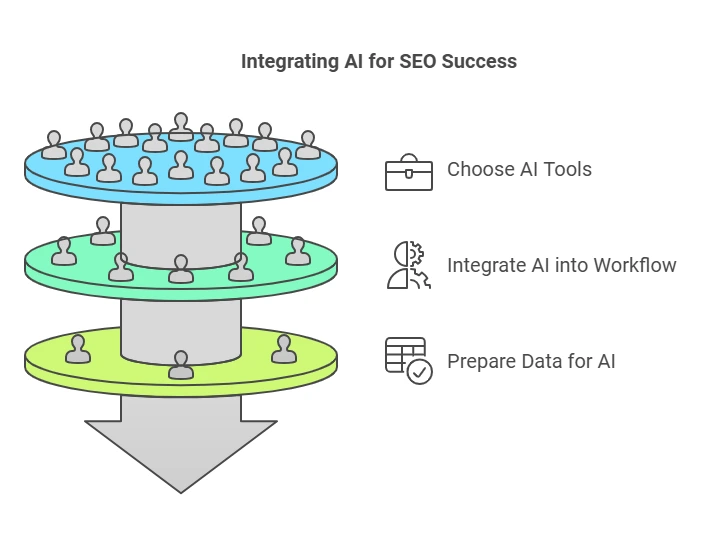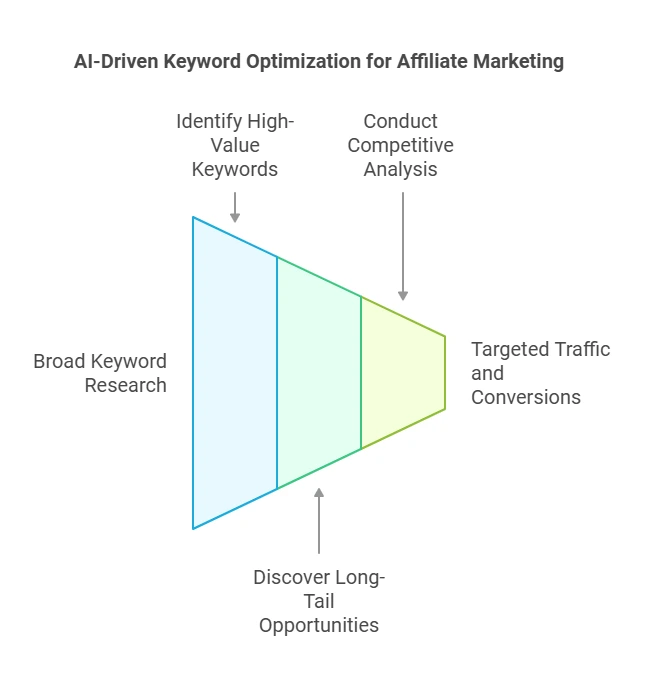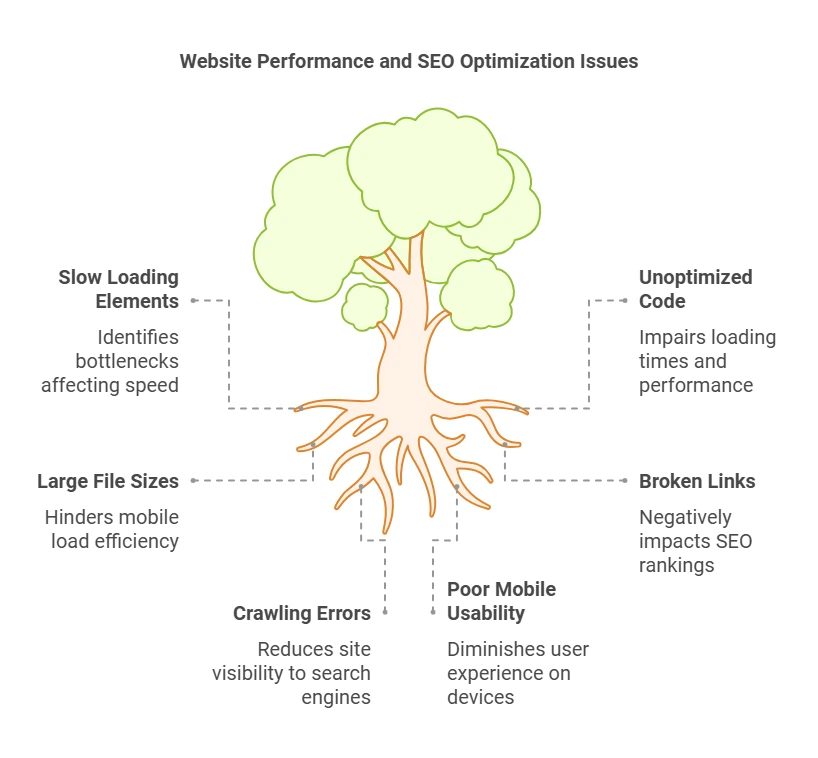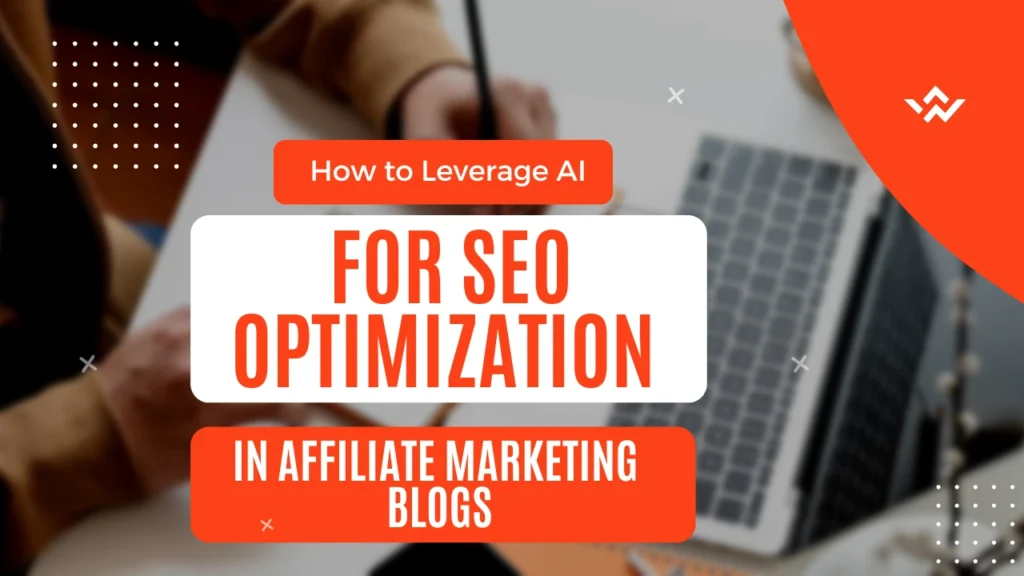Table of Contents
Love this post? Share it!
Introduction
The digital marketing landscape is evolving rapidly, and one of the most transformative technologies driving this change is Artificial Intelligence (AI). For affiliate marketers, where success often hinges on visibility and precision, leveraging AI for SEO optimization can be a game-changer. In this article, we’ll explore why AI is revolutionizing SEO and affiliate marketing, unpack its foundational principles, and provide actionable insights for setting up your AI-powered SEO strategy.
Why AI is Revolutionizing SEO and Affiliate Marketing
The Importance of SEO in Affiliate Marketing Success
Affiliate marketing thrives on traffic—more specifically, quality traffic. Search Engine Optimization (SEO) is the bridge that connects your content to your audience, making it one of the most critical components of a successful affiliate strategy. Effective SEO ensures that your blog ranks high in search engine results, driving organic traffic to your affiliate links. Without it, even the best content risks going unnoticed in the vast sea of the internet.
How AI Tools Are Changing the Game
AI is transforming SEO from a manual, time-consuming task into a dynamic, data-driven process. By automating repetitive tasks like keyword research, performance tracking, and content optimization, AI allows marketers to focus on strategy and creativity. AI tools can analyze vast amounts of data in real time, uncovering insights that were previously inaccessible. This not only boosts efficiency but also provides a competitive edge, enabling marketers to stay ahead in an ever-changing digital environment.
If you’re looking to start and grow your online business successfully, don’t miss out on our expert guide! 🚀 Get your copy of “From Zero to Hero: A Step-by-Step Guide to Making Money Online” today and start building your financial freedom. 👉 Grab your eBook now!
1. Understanding AI and SEO
What is AI and How Does It Work in SEO?
AI, or Artificial Intelligence, refers to the simulation of human intelligence by machines to perform tasks like learning, problem-solving, and data analysis. In the context of SEO, AI-powered tools analyze search engine algorithms, predict trends, and provide actionable recommendations for optimizing your content. For instance, AI can suggest keywords, create optimized meta tags, and even predict which topics are likely to trend, helping you craft content that aligns with user intent.
Key SEO Principles Every Affiliate Marketer Should Know
Before diving into AI, it’s essential to grasp the basics of SEO:
- Relevance: Your content must align with the user’s search intent.
- Authority: High-quality backlinks and robust content boost your domain authority.
- User Experience (UX): Fast-loading, mobile-friendly websites are crucial for SEO.
- Consistency: Regularly updated, well-structured content ensures sustained rankings.
AI enhances these principles by automating tasks like competitive analysis and performance monitoring, making it easier to implement and refine your SEO strategy.
AI’s Role in Automating and Enhancing SEO Processes
AI’s true power lies in its ability to automate tedious processes while providing data-driven insights. From identifying long-tail keywords to optimizing content for voice search, AI tools work tirelessly behind the scenes, enhancing efficiency and accuracy. They also help monitor search engine algorithm updates, ensuring your strategies remain relevant and effective.
2. Setting Up for Success

Choosing the Right AI Tools for SEO
Selecting the right tools is a crucial first step in integrating AI into your affiliate marketing workflow. The market is brimming with options, so focus on tools that cater to your specific needs:
- AI-Powered Keyword Research Tools: Platforms like SEMrush, Ahrefs, and seowriting use AI to uncover high-performing keywords tailored to your niche. They analyze competitor data and provide insights into search volume, keyword difficulty, and more.
- AI-Driven Content Creation Platforms: Tools like Jasper and Copy.ai can generate SEO-friendly content, from blog posts to product descriptions, saving you time without compromising quality.
Integrating AI into Your Blogging Workflow
AI is most effective when seamlessly integrated into your daily operations. Start by identifying pain points in your current workflow—whether it’s content creation, keyword research, or performance monitoring—and then deploy AI tools to address these gaps. Use AI to streamline processes like topic ideation, on-page optimization, and real-time analytics tracking.
Preparing Data for AI-Enhanced SEO
To make the most of AI, you need quality data. AI thrives on information, so ensure your website is equipped with tracking tools like Google Analytics or Search Console. Feed these tools data about your target audience, such as demographics and preferences, to help AI algorithms refine your strategies. Regularly audit your website to ensure that it remains optimized for AI’s capabilities, such as structured data and mobile-friendliness.
By embracing AI for SEO optimization, affiliate marketers can not only improve their blog’s visibility but also create a more efficient and effective workflow. With the right tools and strategies in place, you’ll be well on your way to leveraging AI’s potential to transform your affiliate marketing efforts.
Want to leverage AI to build a profitable online business but don’t know where to start? 🚀 Our beginner-friendly guide walks you through everything you need to know to launch and scale with AI. Don’t miss out—grab your copy of “How to Build an AI-Powered Online Business: A Beginner’s Guide” today! 👉 Get your eBook now!
3. AI for Keyword Research and Content Optimization in Affiliate Marketing Blogs

AI for Keyword Research and Analysis
The Importance of Keyword Research in Affiliate Marketing
Keyword research is the backbone of any successful SEO strategy, especially in affiliate marketing. It’s not just about finding popular search terms—it’s about understanding your audience’s intent and aligning your content with what they’re searching for. The right keywords connect your blog to the needs of potential buyers, driving targeted traffic to your site and increasing the likelihood of conversions.
Using AI to Identify High-Value Keywords
AI has revolutionized keyword research by making it faster, more precise, and deeply insightful. AI-powered tools analyze vast datasets to identify keywords that are not only popular but also strategically valuable. These tools can assess factors such as:
- Search Volume: Identifying keywords that your audience actively searches for.
- Competition: Highlighting less competitive keywords to give you an edge.
- Trends: Predicting emerging keywords based on current data.
Platforms like SEMrush and Ahrefs use AI to uncover high-value keywords tailored to your niche, helping you prioritize efforts for maximum impact.
Long-Tail Keywords: Finding Hidden Opportunities with AI
While short-tail keywords often have high search volume, they’re also fiercely competitive. AI tools excel at finding long-tail keywords—specific, lower-competition phrases that often indicate higher purchase intent. For instance, instead of targeting “best laptops,” AI might suggest “best budget laptops for college students in 2025.” These keywords may have fewer searches but often result in higher conversion rates, making them a goldmine for affiliate marketers.
Competitive Analysis with AI: Staying Ahead of the Curve
Staying ahead of competitors is crucial in affiliate marketing, and AI makes this easier than ever. By analyzing competitor websites, AI tools can:
- Highlight the keywords they rank for.
- Identify content gaps you can exploit.
- Provide insights into their backlink strategies.
With these insights, you can refine your SEO approach to outperform competitors in your niche.
3. Content Optimization with AI
Creating SEO-Friendly Content Using AI Tools
AI-driven content creation tools like Jasper or Copy.ai help you craft SEO-optimized content effortlessly. These tools generate suggestions for keyword placement, meta descriptions, and even content ideas, ensuring your posts are both search-engine-friendly and engaging for readers. AI also evaluates your content for readability and relevance, making it easier to attract and retain your target audience.
Struggling to create SEO-optimized articles, blog posts, or affiliate content effortlessly? ✍️ Try this powerful AI writing tool that generates high-quality content in 1 click, supports 48 languages, and even auto-posts to WordPress with AI-generated images! 🚀 Boost your content game today! 👉 Try it now!
Enhancing Readability and Engagement with AI
Readability plays a key role in user engagement and SEO rankings. AI tools analyze your content for:
- Sentence structure and flow.
- Use of active voice.
- Readability scores based on your target audience’s level.
This ensures that your content is not only optimized for search engines but also enjoyable for readers.
AI-Assisted Content Structuring for Better SERP Rankings
Search engines favor well-structured content. AI tools can help you:
- Organize content into clear sections with subheadings.
- Create concise summaries for featured snippets.
- Optimize for questions and answers commonly searched by users.
This structuring enhances your blog’s chances of ranking higher in SERPs (Search Engine Results Pages).
Avoiding Plagiarism and Ensuring Originality with AI
Original content is critical for maintaining credibility and avoiding penalties from search engines. AI-powered plagiarism checkers like Grammarly or Copyscape help ensure your work is unique. These tools scan billions of web pages to verify originality, giving you confidence in your content’s authenticity.
4. Improving On-Page SEO with AI
Meta Tags, Titles, and Descriptions: AI’s Role
AI tools generate optimized meta tags, titles, and descriptions tailored to specific keywords. These elements are often the first thing users see in search results, making them crucial for click-through rates. AI ensures these components are compelling, relevant, and within character limits.
Optimizing Headers and Subheadings for SEO
Headers and subheadings play a vital role in SEO and readability. AI tools analyze your headings to:
- Include target keywords naturally.
- Ensure hierarchical consistency (e.g., H1, H2, H3).
- Improve clarity and engagement.
Image Optimization Using AI Tools
Images enhance user experience but can slow down your site if not optimized. AI tools help by:
- Compressing images without losing quality.
- Generating alt text descriptions that improve accessibility and SEO.
- Suggesting relevant images based on your content.
Improving Internal Linking Strategies with AI
Internal links connect your content, guiding readers and search engines through your site. AI tools like Link Whisper analyze your posts to:
- Identify linking opportunities to related content.
- Ensure links use SEO-friendly anchor text.
- Prevent broken or redundant links.
By combining the power of AI with proven SEO strategies, affiliate marketers can create content that resonates with audiences and ranks higher in search results. Whether it’s finding the perfect keyword or crafting a user-friendly blog, AI tools provide the precision and efficiency needed to stand out in a competitive market.
5. Off-Page SEO and AI
Building High-Quality Backlinks with AI Assistance
Backlinks remain one of the most influential factors in search engine rankings. However, building high-quality backlinks can be a labor-intensive task. AI simplifies this by:
- Identifying Relevant Websites: AI tools like Ahrefs and SEMrush pinpoint high-authority sites within your niche.
- Crafting Outreach Emails: AI-driven platforms like Jasper can generate personalized, engaging outreach messages to increase your chances of securing backlinks.
- Analyzing Competitor Backlinks: AI reveals where competitors are earning backlinks, providing you with actionable insights to target similar opportunities.
By automating much of the research and outreach process, AI accelerates your backlink-building efforts while maintaining quality.
Monitoring and Analyzing Off-Page SEO Performance
Keeping tabs on your off-page SEO efforts is essential for refining strategies and ensuring effectiveness. AI-powered tools provide:
- Real-Time Monitoring: Track changes in your backlink profile, domain authority, and referral traffic.
- Sentiment Analysis: Understand how your brand is perceived online through AI analysis of reviews, social mentions, and comments.
- Impact Assessment: Evaluate which backlinks and external mentions contribute the most to your SEO success.
Leveraging AI for Social Media and Influencer Outreach
Social media and influencer collaborations play a crucial role in off-page SEO by driving traffic and generating backlinks. AI can assist by:
- Identifying Influencers: Tools like Heepsy or BuzzSumo use AI to find influencers aligned with your niche and audience.
- Optimizing Social Media Content: AI analyzes engagement metrics to determine the best times to post and the types of content that resonate with your audience.
- Tracking Campaign Performance: AI tracks traffic and backlinks generated through social media and influencer campaigns, helping you gauge ROI.
6. Technical SEO Made Easy with AI

Using AI to Improve Website Speed and Performance
Website speed is a critical ranking factor, and AI tools like Cloudflare and PageSpeed Insights make optimization seamless by:
- Identifying Bottlenecks: Pinpointing slow-loading elements such as large images or excessive scripts.
- Optimizing Code: Cleaning up CSS, JavaScript, and HTML to improve loading times.
- Compressing Assets: Automatically reducing file sizes without sacrificing quality.
AI ensures your website runs smoothly, enhancing user experience and SEO performance.
Mobile Optimization: AI-Driven Solutions
With mobile-first indexing now the standard, ensuring your site is mobile-friendly is non-negotiable. AI-powered tools assist by:
- Responsive Design Testing: Evaluating how your site performs across various devices and screen sizes.
- Optimizing Mobile Load Times: Reducing mobile-specific loading issues like large files or unoptimized media.
- Improving UX: AI tools analyze user behavior to suggest adjustments for mobile navigation, layout, and usability.
Fixing Broken Links and Crawling Issues with AI
Broken links and crawling errors can significantly harm your SEO efforts. AI tools like Screaming Frog or SEMrush streamline this process by:
- Identifying Issues: Automatically detecting broken links, 404 errors, and crawling issues.
- Prioritizing Fixes: Highlighting the most critical problems based on their impact on SEO.
- Suggesting Solutions: Offering recommendations to fix errors and improve your site’s crawlability.
7. Analytics and Monitoring with AI
Real-Time Performance Tracking Using AI Tools
AI enables real-time performance tracking, allowing you to make data-driven decisions on the fly. Tools like Google Analytics 4, powered by AI, provide:
- Instant Insights: Real-time updates on traffic, user behavior, and engagement metrics.
- Alerts: Notifications for significant changes, such as traffic spikes or drops, so you can act immediately.
Interpreting Analytics Data for SEO Strategy Adjustments
Analyzing data manually can be overwhelming, but AI simplifies the process by:
- Identifying Patterns: AI detects trends and correlations that might go unnoticed.
- Highlighting Opportunities: Suggesting areas where improvements could yield significant results, such as underperforming pages or missed keyword opportunities.
- Providing Visualizations: AI tools create easy-to-understand dashboards and graphs for better decision-making.
Predictive Analysis: Forecasting Trends with AI
One of AI’s most powerful features is its ability to predict future trends. By analyzing historical data, AI tools can forecast:
- Search Trends: Anticipating popular keywords and topics before they peak.
- User Behavior: Predicting how users might interact with your content in different scenarios.
- Market Shifts: Providing insights into changes in consumer preferences or competitive dynamics.
Predictive analysis helps you stay ahead of the curve, enabling proactive adjustments to your SEO strategy.
By integrating AI into off-page SEO, technical optimizations, and performance monitoring, affiliate marketers can achieve unparalleled efficiency and effectiveness. Whether it’s building backlinks, optimizing for mobile, or forecasting trends, AI equips you with the tools needed to excel in an increasingly competitive digital landscape.
8. Enhancing User Experience (UX) with AI
Personalizing User Experiences for Better Engagement
In today’s digital landscape, users expect content tailored to their preferences. AI excels in creating personalized experiences by:
- Analyzing User Behavior: Tools like Google Analytics 4 and HubSpot track visitor interactions, identifying trends and preferences.
- Dynamic Content Delivery: AI-powered platforms, such as Optimizely, customize content based on user profiles, ensuring relevance.
- Predictive Personalization: AI predicts user needs and serves appropriate recommendations, boosting engagement and reducing bounce rates.
Personalization fosters loyalty and keeps users coming back for more.
AI for Optimizing Navigation and Site Layout
Seamless navigation and an intuitive layout are crucial for user satisfaction. AI enhances these elements by:
- Mapping User Journeys: Understanding how users interact with your site and identifying pain points.
- Optimizing Menus: AI tools suggest streamlined navigation structures to improve usability.
- Testing Variations: Platforms like Crazy Egg use AI to test different layouts and recommend designs that perform best.
AI ensures your site is both user-friendly and conversion-optimized.
Ensuring Accessibility and Inclusivity with AI Tools
Accessibility is not just a legal requirement but also a crucial component of UX. AI supports inclusivity by:
- Identifying Accessibility Issues: Tools like WAVE and Axe detect problems such as improper alt text or insufficient color contrast.
- Generating Accessible Content: AI-powered solutions automatically provide suggestions for making content usable by all, including those with disabilities.
- Voice and Screen Reader Optimization: AI ensures your site is compatible with assistive technologies, broadening your audience reach.
10. Ethical and Practical Considerations
Balancing Automation and Human Creativity
While AI automates repetitive tasks, maintaining a human touch is essential for authentic engagement. To strike a balance:
- Use AI for Assistance, Not Replacement: Leverage AI for data analysis and optimization but retain human oversight for creativity.
- Regularly Review AI Outputs: Ensure the content aligns with your brand voice and resonates emotionally with your audience.
Avoiding Over-Reliance on AI
AI is a powerful tool, but over-reliance can lead to generic content and diminished innovation. Safeguard against this by:
- Incorporating Diverse Perspectives: Supplement AI insights with human creativity to produce fresh and original ideas.
- Staying Updated: Continuously monitor AI tools for accuracy and relevance, adapting as needed.
Adhering to Ethical AI Use in SEO
Ethical AI use builds trust with your audience and search engines. Best practices include:
- Transparency: Clearly disclose when content or recommendations are AI-generated.
- Data Privacy: Use AI in compliance with data protection laws like GDPR to safeguard user information.
- Fairness: Ensure your AI tools do not unintentionally promote biases or discriminatory practices.
Case Studies and Examples
Success Stories: Affiliate Marketing Blogs Leveraging AI
Many affiliate marketers have transformed their SEO strategies with AI. Examples include:
- Boosting Traffic: A health and wellness blog used AI-powered keyword tools, increasing organic traffic by 40% in three months.
- Improving UX: A technology affiliate site utilized AI for personalized recommendations, doubling user engagement rates.
AI-Driven Strategies That Delivered Measurable Results
AI has enabled significant results, such as:
- Enhanced CTR: Blogs employing AI for meta tag optimization saw click-through rates improve by 20%.
- Faster Content Production: Using AI-driven content platforms, marketers produced high-quality articles 50% faster.
Learning from Failures: Common AI Missteps
Not every AI implementation is a success. Common pitfalls include:
- Misinterpreting Data: Relying on flawed AI analysis led to irrelevant content strategies.
- Ignoring Human Oversight: Over-trusting AI resulted in generic or culturally insensitive content.
By studying failures, marketers can fine-tune their approach and avoid repeating mistakes.
AI is a transformative force in enhancing UX and boosting affiliate marketing success. By integrating AI thoughtfully and ethically, you can deliver tailored experiences, foster engagement, and stay competitive in a rapidly evolving digital environment.
Future Trends in AI and SEO
Emerging AI Technologies to Watch
The future of AI in SEO is teeming with potential. Emerging technologies to keep an eye on include:
- AI-Powered Voice Search Optimization: As voice assistants like Alexa and Siri evolve, AI tools will help optimize content for voice search queries.
- Generative AI for Dynamic Content: Tools like ChatGPT and Jasper will continue to revolutionize real-time, tailored content creation.
- Advanced Predictive Analytics: AI systems will better forecast trends, enabling marketers to proactively adapt their strategies.
- Visual AI: Enhancements in AI for image and video SEO will drive richer multimedia experiences.
The Evolving Role of AI in Affiliate Marketing
AI is becoming indispensable in affiliate marketing, shaping strategies and streamlining workflows. Its roles include:
- Real-Time Campaign Optimization: AI-driven analytics allow marketers to adjust their campaigns on the fly for maximum ROI.
- Precision Targeting: AI helps identify niche audiences and craft highly personalized messages.
- Enhanced Collaboration: By automating routine tasks, AI frees marketers to focus on building stronger partnerships and innovative strategies.
Preparing for the Future of AI-Driven SEO
To stay ahead, affiliate marketers should:
- Embrace Continuous Learning: Stay updated on the latest AI advancements and training tools.
- Experiment with AI Applications: Test and refine AI tools across various SEO tasks to discover what works best.
- Focus on Adaptability: Be prepared to pivot strategies as AI technology evolves.
- Prioritize Ethical Practices: Commit to transparency, privacy, and fairness in AI use.
Conclusion
Key Takeaways on AI for SEO Optimization
- Efficiency: AI streamlines tasks like keyword research, content creation, and data analysis.
- Personalization: AI enhances user experience through tailored recommendations and dynamic content.
- Scalability: With AI, even small teams can compete with larger entities by automating complex processes.
The Long-Term Benefits of Leveraging AI in Affiliate Marketing
AI’s ability to analyze vast amounts of data and provide actionable insights offers:
- Sustained Growth: AI-driven strategies help maintain steady traffic and engagement.
- Improved ROI: Precision targeting and campaign optimization lead to higher conversion rates.
- Future-Readiness: Early adoption positions marketers as leaders in the evolving digital space.
Final Thoughts on Staying Competitive in a Digital World
The synergy between AI and SEO is a game-changer for affiliate marketers. By staying informed and integrating AI thoughtfully, you can create robust, adaptable strategies that keep you ahead of the competition. The key is to balance automation with human creativity, ensuring your content remains authentic and engaging.
FAQs
What is the best AI tool for SEO in affiliate marketing?
There’s no one-size-fits-all tool, but popular options include Semrush for analytics, Jasper for content creation, and Surfer SEO for optimization. Choose based on your specific needs and budget.
Can AI completely replace human effort in SEO?
No, AI is a powerful assistant but not a complete replacement. Human creativity, judgment, and strategic planning are still crucial for success.
How much does it cost to implement AI tools for SEO?
Costs vary widely. Some tools offer free versions or trials, while premium options can range from $30 to several hundred dollars per month.
What are the risks of using AI for SEO?
Risks include over-automation, reliance on inaccurate data, and potential ethical concerns such as bias in AI algorithms. Regular monitoring and human oversight mitigate these risks.
How can beginners start using AI for SEO optimization?
Start small with beginner-friendly tools like Google’s free AI-powered analytics tools or affordable platforms like Rank Math. Learn the basics of SEO and gradually incorporate AI into your workflow.
By leveraging AI strategically, affiliate marketers can navigate the complexities of SEO with confidence, ensuring long-term success in an ever-changing digital landscape.

